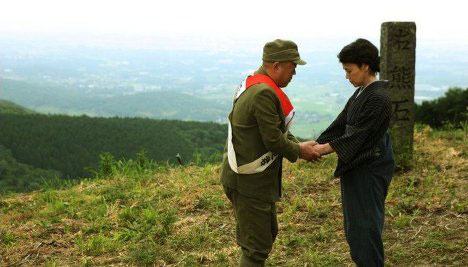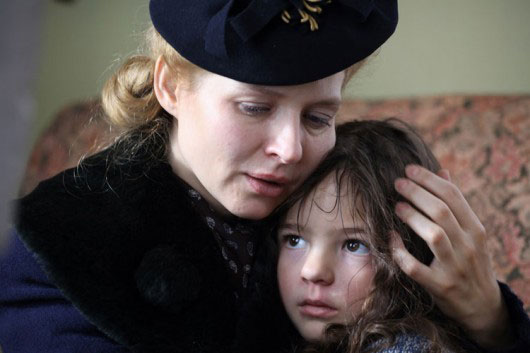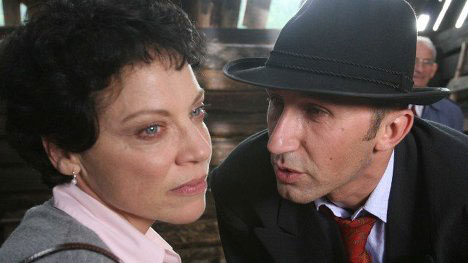
The Echo of War
/ Главная / Russkiy Mir Foundation / Publications / The Echo of WarThe Echo of War
The 33rd Moscow International film Festival has come to an end. The jury, chaired by the renowned actress Geraldine Chaplin, awarded the main prize to the young Spanish director Alberto Morais for his film Waves. Only one of our compatriots received an award – Sergei Loban, creator of Chapiteau Show. His efforts earned him the Special Jury Prize. But now that the festival passions have died down, we can take a calm and measured look at its competitive program. It included a number of films on a subject both important and tragic for our peoples – the Second World War. And it was interesting to see how different directors tackled this theme.

The 99-year-old Kaneto Shind
Another living classic, director Felix Falks, participated in the competitive program with his film Joanna. He raised the worrisome spectacle of Polish anti-Semitism during the Second World War. His heroine is a Polish woman named Joanna, who provides refuge to a Jewish girl named Roza and becomes a double victim: she is forced to give herself over to the pleasures of a German officer in order to keep him from disclosing her secret while her own people, fighters of the underground, accuse her of collaboration and shave her head, making her a mockery. The girl is saved by Joanna is a broken person without the strength to live on.
The Hungarian director Judit Elek brought to Moscow her film Retrace, which was based on event which transpired in her own life. At seven years of age, the young Judit Elek was placed in the Jewish ghetto of Budapest, and her mind blocked off everything that had happened prior to the Holocaust. It turned out to be very difficult to rebuild her memories from peaceful childhood – flashbacks revealed little by little, but this happened only when she was already an adult.
The heroine of the film is the forty-year-old Katrina (the film takes place in 1980) who has much in common with Elek. Katrina has long lived in prosperity, protected by American laws, with her husband Steve and their young daughter. But she is haunted by nightmares – time and time again she is overwhelmed by fear, hears bits of German speech and sees the train that took her loved ones away to a concentration camp. She alone managed to survive; her entire family was destroyed by fascists. Her husband, who is a psychologist, decides to try to help her by taking her back to the place where it all took place, to retrace that awful path and overcome the nightmares of the past. Katrina’s hometown following the war ceased to belong to Hungary and was now part of Romania.

Romania of the 1980 was practically the same as the Soviet stagnation of the Brezhnev era. This American family with disbelief stares at the enormous portraits of Ceau
New publications

 Mikhail Kalatozov, a director who transformed the world of cinematography in many ways, was born 120 years ago. He was a Soviet film official and a propagandist. Above all, he was capable of producing movies that struck viewers with their power and poetic language.
Mikhail Kalatozov, a director who transformed the world of cinematography in many ways, was born 120 years ago. He was a Soviet film official and a propagandist. Above all, he was capable of producing movies that struck viewers with their power and poetic language.  Ukrainian authorities have launched a persecution campaign against the canonical Ukrainian Orthodox Church (UOC), the biggest one in the country's modern history. Over the past year, state sanctions were imposed on clergy representatives, searches were conducted in churches, clergymen were arrested, criminal cases were initiated, the activity of the UOC was banned in various regions of the country, and monasteries and churches were seized.
Ukrainian authorities have launched a persecution campaign against the canonical Ukrainian Orthodox Church (UOC), the biggest one in the country's modern history. Over the past year, state sanctions were imposed on clergy representatives, searches were conducted in churches, clergymen were arrested, criminal cases were initiated, the activity of the UOC was banned in various regions of the country, and monasteries and churches were seized.  When Nektary Kotlyaroff, a fourth-generation Russian Australian and founder of the Russian Orthodox Choir in Sydney, first visited Russia, the first person he spoke to was a cab driver at the airport. Having heard that Nektariy's ancestors left Russia more than 100 years ago, the driver was astonished, "How come you haven't forgotten the Russian language?" Nektary Kotlyaroff repeated his answer in an interview with the Russkiy Mir. His affinity to the Orthodox Church (many of his ancestors and relatives were priests) and the traditions of a large Russian family brought from Russia helped him to preserve the Russian language.
When Nektary Kotlyaroff, a fourth-generation Russian Australian and founder of the Russian Orthodox Choir in Sydney, first visited Russia, the first person he spoke to was a cab driver at the airport. Having heard that Nektariy's ancestors left Russia more than 100 years ago, the driver was astonished, "How come you haven't forgotten the Russian language?" Nektary Kotlyaroff repeated his answer in an interview with the Russkiy Mir. His affinity to the Orthodox Church (many of his ancestors and relatives were priests) and the traditions of a large Russian family brought from Russia helped him to preserve the Russian language.

 The leaders of the Friends of the Great Russia cultural association (Amici Della Grande Russia) in Italy believe that the Western policy of abolishing Russian culture in Europe has finally failed. Furthermore, it was doomed to failure from the beginning.
The leaders of the Friends of the Great Russia cultural association (Amici Della Grande Russia) in Italy believe that the Western policy of abolishing Russian culture in Europe has finally failed. Furthermore, it was doomed to failure from the beginning.  Name of Vladimir Nemirovich-Danchenko is inscribed in the history of Russian theater along with Konstantin Stanislavski, the other founding father of the Moscow Art Theater. Nevertheless, Mr. Nemirovich-Danchenko was a renowned writer, playwright, and theater teacher even before their famous meeting in the Slavic Bazaar restaurant. Furthermore, it was Mr. Nemirovich-Danchenko who came up with the idea of establishing a new "people's" theater believing that the theater could become a "department of public education."
Name of Vladimir Nemirovich-Danchenko is inscribed in the history of Russian theater along with Konstantin Stanislavski, the other founding father of the Moscow Art Theater. Nevertheless, Mr. Nemirovich-Danchenko was a renowned writer, playwright, and theater teacher even before their famous meeting in the Slavic Bazaar restaurant. Furthermore, it was Mr. Nemirovich-Danchenko who came up with the idea of establishing a new "people's" theater believing that the theater could become a "department of public education."  "Russia is a thing of which the intellect cannot conceive..." by Fyodor Tyutchev are famous among Russians at least. December marks the 220th anniversary of the poet's birth. Yet, he never considered poetry to be his life's mission and was preoccupied with matters of a global scale. Mr.Tyutchev fought his war focusing on relations between Russia and the West, the origins of mutual misunderstanding, and the origins of Russophobia. When you read his works today, it feels as though he saw things coming in a crystal ball...
"Russia is a thing of which the intellect cannot conceive..." by Fyodor Tyutchev are famous among Russians at least. December marks the 220th anniversary of the poet's birth. Yet, he never considered poetry to be his life's mission and was preoccupied with matters of a global scale. Mr.Tyutchev fought his war focusing on relations between Russia and the West, the origins of mutual misunderstanding, and the origins of Russophobia. When you read his works today, it feels as though he saw things coming in a crystal ball...